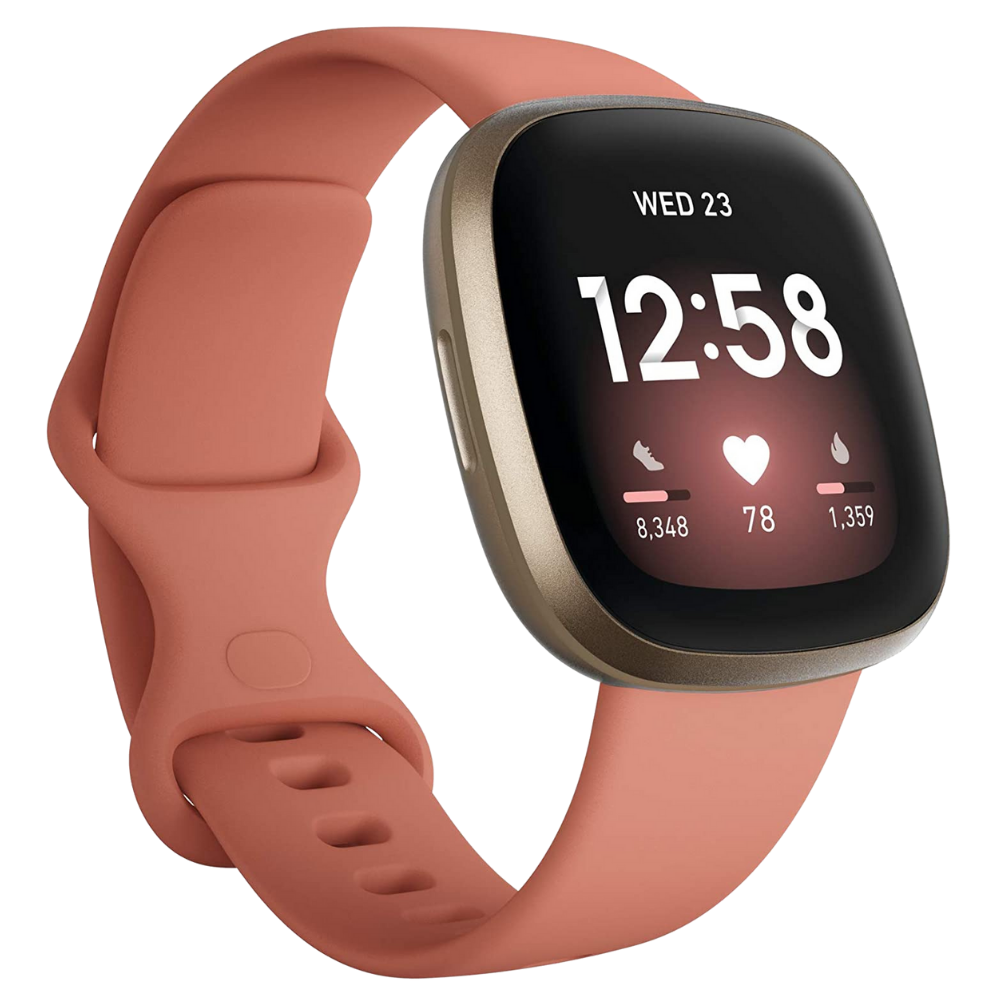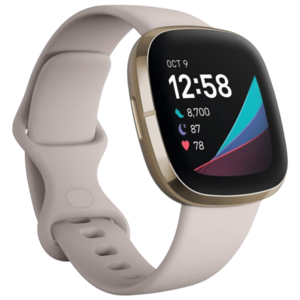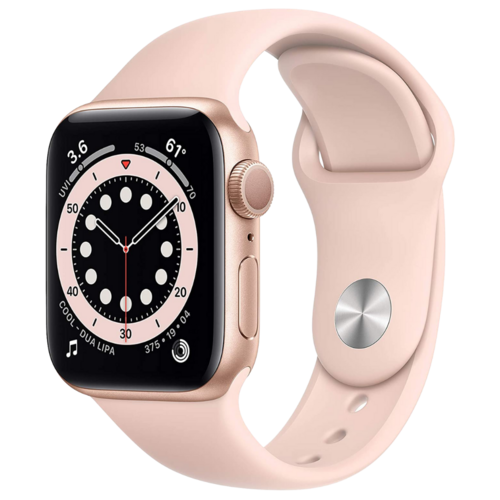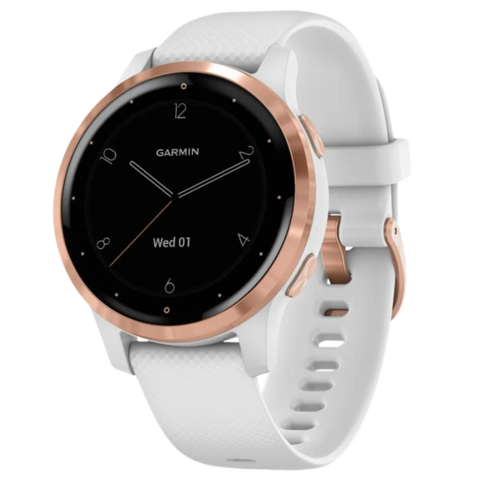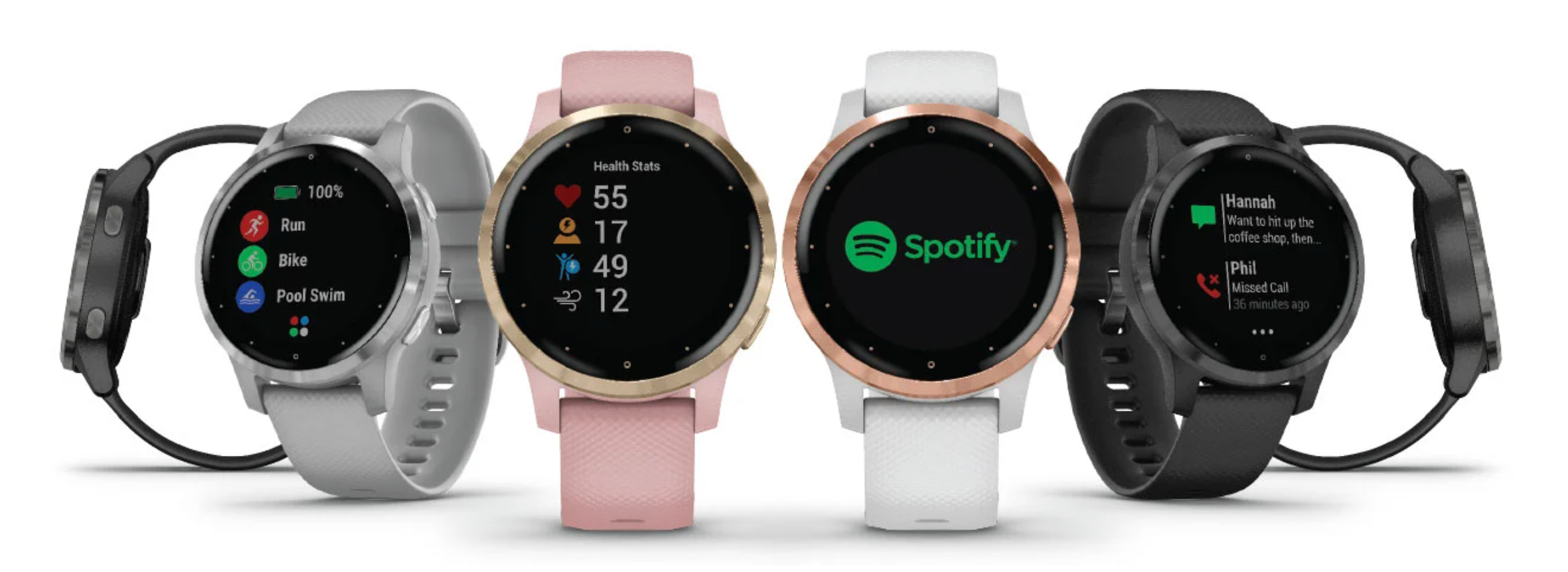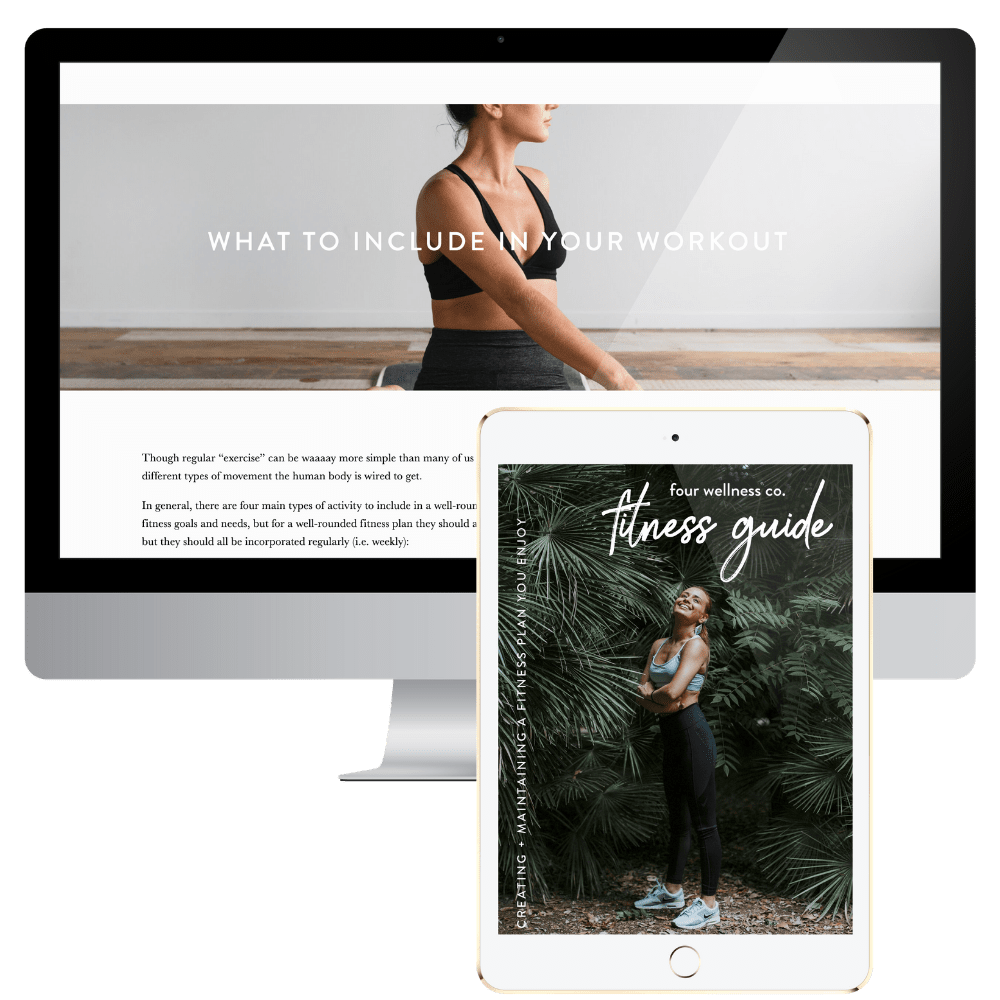The Best Fitness Trackers for Staying Active in 2021
This post contains affiliate links, through which we may earn a small commission if you choose to purchase, at no additional cost to you. We only share products or services we personally use & recommend!
Not too long ago, the term “fitness tracker” most likely referred to a handwritten piece of paper that hung on your fridge to track fitness goals… Did I work out today? Yep, check it off on the ol’ fitness tracker! ✔️
Now, fitness tracker is a household name with a very different meaning.
Companies like Fitbit, Apple, Garmin (and others) have developed some pretty effective little tools for tracking and managing our fitness and other health metrics.
Do you need a fitness tracker to get or stay fit?
Of course not!
But, there are some benefits to using a fitness tracker to monitor your daily activity and achieve your overall health and fitness goals.
The benefits of using a fitness tracker
Some people like them for their smartwatch capabilities, some people enjoy the hottest new gadget—we like fitness trackers for their behind-the-scenes work tracking health metrics and reminding us to do something that doesn’t come so naturally in our modern lifestyles: move more.
Depending which particular fitness tracker you’re using (and there are a lot! Fitbit, Apple Watch, Garmin just to name a few…), there are actually many health benefits to these special little fitness-tracking watches.
Regularly wearing a fitness tracker like a Fitbit or Apple Watch means you’re more likely to:
Reach daily movement goals (like the 10,000 daily steps we recommend!)
Achieve larger fitness goals (like losing weight or running a marathon)
Stand up more throughout the day (a simple but hugely important wellness “activity”!)
Though a fitness tracker is certainly helpful for measuring and monitoring your daily activity or tracking workouts, it doesn’t actually do those workouts for you—so why are they so helpful for achieving our health and fitness goals?
We give energy to that which we think about.
Wearing a fitness tracker and receiving the information and reminders/notifications from it keeps our fitness and wellness goals top of mind—meaning, we’re more likely to remember to stand up from our desk each hour, or get out the door for that scheduled training run, or build the habit of taking an afternoon walk.
Another reason fitness trackers are helpful in achieving fitness goals:
You can’t manage what you don’t measure.
Fitness trackers are also helpful because we tend to struggle to manage things we don’t consciously measure. It’s really hard to say “I want to be more fit” and just go for it. There’s quite a bit of evidence that goals of any sort (and especially fitness goals) are more likely to be achieved if they’re tangible and measurable (learn more about setting and achieving S.M.A.R.T. goals).
Fitness trackers allow us those helpful, measurable details that make our goals more successful.
So, we can start with “I want to be more fit”—but that becomes “I’ll walk for 30 minutes today.” And we can then measure whether (or not) we walked 30 minutes that day. Our wristwatch gives us reminders if we haven’t done it yet. (Accountability!) And we can start to see and connect how our daily walk contributes to other health metrics, like our weight, resting heart rate, BMI, etc.
Is a fitness tracker worth the cost?
Health coaches are perhaps a bit biased, because we’re all about helping people make “healthy living” easier, but we’d say: Yes, if you can afford it, a fitness tracker is a helpful way to reach your fitness goals and stay more active overall.
How to choose the best fitness tracker for your needs
There are a wide range of fitness trackers easily available, most with very comparable functionality, though there are some key differences to note too. Choosing the best fitness tracker for your needs depends on a few factors, like:
what you’re going to use it for (and the features you’ll need to do that)
the type of smartphone you have (many of the features will be managed or connected via your smartphone, and some fitness trackers work better with certain smartphone operating systems—more on that below)
your budget
With these factors in mind, let’s take a look at the most popular fitness trackers available to choose from!
The best fitness trackers for staying active in 2021
Each year, there are more and more fitness trackers becoming viable options for tracking a range of helpful health metrics. (In the early days of Four Wellness Co., Fitbit was the primary option available, and really the only one we spoke about—but there are now many more!)
Below, we’ll chat through our favorite fitness tracker smartwatches, specific details on each, and how to determine which is best for you.
Our favorite fitness trackers
Features to look for in a smartwatch fitness tracker:
workout tracking: Look for a watch that recognizes and tracks the types of workouts you’ll be doing (e.g. walking, running, cycling, swimming, HIIT training, etc.). Bonus points if it has helpful features like workout detection (so it will remind you if you’ve forgotten to start logging a workout).
built-in GPS: We look for watches with built-in GPS to accurately record activity when you’re outside the bluetooth range of your smartphone (in other words, that give you the option to leave your phone at home while using your watch to record a workout).
health metrics: Today’s fitness trackers are capable of recording a range of health metrics, so keep an eye out for the metrics you’re interested in knowing. For example, if you’re focused on heart health, you may want to look for an option with ECG measurement.
battery life: We look for a watch that reasonably lasts a full day between charges, and could be used to track a marathon-length activity.
durability: A durable fitness tracker should be water (and sweat! 😅) resistant. Fortunately, most options today are just that.
connected apps: Smartwatches can include many helpful features besides tracking health metrics and workouts—we look for one that can play music, receive text messages and calls, and serve as your digital wallet.
Fitbit Versa
Fitbit is the original fitness tracker “make,” so they have a wide range of fitness tracker and smartwatch options, and have been a leader in this technology for many years. Though Fitbit has quite a few wearable fitness trackers to choose from, for our purposes, the entry-level Fitbit smartwatch with the features we’re looking for is the Fitbit Versa 3.
The Fitbit app is used to track all data from Fitbit wearables, as well as additional health information like weight, menstrual cycle, food log, hydration, and other health goals. Fitbit was recently purchased by Google, so even though the Fitbit app is certainly functional for both Android and iOS operating systems, it’s likely to be a better fit for Android users.
Fitbit Versa 3 features:
built-in GPS
goal-based exercise tracking, workout detection
health metrics: heart rate, blood oxygen saturation
additional health monitoring: sleep tracking + smart wake, guided breathing sessions, menstrual health
store and play music or podcasts from Spotify, Pandora or Deezer
Fitbit Pay secure payment
Google Assistant or Alexa integration
receive calls, texts and other notifications
hundreds of additional apps available to download
6+ day battery life (based on average use; 12 hours of continuous GPS battery life)
water-resistant to 50 meters
customizable watch bands
Price: $
The Fitbit Versa 3 is one of the more affordable fitness trackers with built-in GPS and other features comparable to top fitness tracker smartwatches.
Fitbit’s newest fitness tracker model is the Sense, a higher-end version of the Versa 3. It includes all the features of the Versa noted above, plus:
Additional Fitbit Sense features:
electrodermal activity sensor measures stress and gives a daily Stress Score
high and low heart rate notifications
velvety soft “infinity band” is designed to be more comfortable for all day/night wearing
Price: $$
The Fitbit Sense is very similar to the Fitbit Versa 3, but a step up in design and comfort, and includes more functionality in stress management and mindfulness.
Though the Apple Watch was perhaps originally designed as more of a smartwatch with a focus on apps rather than a true fitness tracker, it’s now a robust health tool in its own right.
There are a few different Apple Watch models currently available through Apple (and more older models still available elsewhere online), but the new Apple Watch Series 6 is one of the best fitness trackers available, so we’ll focus on that.
It has all the cutting edge functionality and sleek, minimalist design Apple is known for. Though one of the pricier fitness tracker options, the Apple Watch also has more complete functionality as a smartwatch, and comes with the security of quality and durability you get with Apple products.
The Apple Watch is designed as a companion to the iPhone, so is, of course, a better option for existing iPhone users.
Apple Watch Series 6 features:
built-in GPS (+ cellular upgrade option)
fitness detection, fitness goals, fitness challenges
health metrics: heart rate, blood oxygen saturation, ECG, high, low and irregular heart rate notifications
additional health monitoring: sleep trends + bedtime routine, movement, stand time and mindfulness notifications
full integration with Apple Health app for further health tracking and management (weight, menstrual health, etc.)
listen to music, podcasts, audiobooks via Apple Music, Apple Podcast and Audible
paid integration with Apple Fitness+ *get 3 months free with a new Apple Watch
Apple Pay secure payments
Siri integration
receive text messages + phone calls
water-resistant to 50 meters
customizable watch bands
Price: $$$
There are some older Apple Watch models also available for consideration if speed and longevity aren’t your greatest concerns and you’re looking for something more affordable in the short-term… but, in general, it’s worth it to invest in the newest model, which has the most features and will be relevant to Apple’s operating system the longest.
The Apple Watch Series 6 is the latest (and best) fitness tracker and smartwatch for iPhone users.
Garmin has several different smartwatches, most of which are designed for more rugged use. Here we’re reviewing the Garmin Vivoactive, which is most comparable to the fitness tracking capability of the Apple Watch and Fitbit line of fitness trackers. (Though certainly take a peek at other Garmin models if you’re looking for a more rugged watch for outdoor activities!)
Garmin Vivoactive features:
built-in GPS
pre-loaded workouts, on-screen workout instructions, create your own workouts
health metrics: heart rate, blood oxygen saturation
Body Battery™ energy monitoring to monitor your body’s energy levels throughout the day
additional health monitoring: stress, sleep, hydration, menstrual health
download songs or playlists from Spotify, Deezer or Amazon Music
Garmin Pay (with participating providers)
receive text + email notifications
battery life up to 8 days, or 6 hours with GPS tracking + music
water-resistant up to 50 meters
Price: $$$
The Garmin Vivoactive is a great fitness and workout tracker, and the Body Battery™ energy tracker is pretty cool, but it doesn’t have all of the same “additional” functionality of some of the other smartwatches available.
Choosing the best fitness tracker for you
Here’s our take on the best fitness tracker for different needs or purposes:
Best all-around fitness tracker for iPhone users:
Best all-around fitness tracker for Android users:
The best fitness tracker for…
monitoring heart health: Apple Watch Series 6
overall health tracking: Apple Watch Series 6
mindfulness & stress management: Fitbit Sense
rugged activities: anything Garmin
running: toss up! (they’re all good for tracking runs)
battery life: Fitbit Sense or Fitbit Versa 3
cellular connection: Apple Watch Series 6
comfort: Fitbit Sense
looks nice with professional or dress clothes: Garmin Vivoactive
listening to music, podcasts & audiobooks: depends which apps you use for this (see above for iOS/Android best options)
affordability: Fitbit Versa 3
ease of use: Apple Watch Series 6
Grab our printable & fillable Fitness Plan
Wish you had an easy way to plan out your fitness goals? We’ve got you covered!
Download our printable/fillable Fitness Guide—it’s part of our Wellness Library of healthy living guides + resources. The Fitness Guide includes:
✔️ how to set specific + attainable fitness goals
✔️ tips for creating a workout plan you actually enjoy
✔️ how to schedule your workouts to set yourself up for success
✔️ a printable/fillable fitness plan + schedule
Four Wellness Tip
Using a fitness tracker can help you maintain an active lifestyle, as well as achieve broader health & fitness goals.


